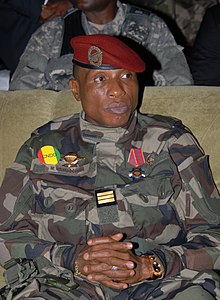
Back ሙሳ ዳዲ ካማራ Amharic موسى داديس كامارا Arabic موسى داديس كامارا ARZ Moussa Dadis Camara Breton Moussa Dadis Camara Czech Moussa Dadis Camara German Μουσά Νταντίς Καμαρά Greek Moussa Dadis Camara Spanish Moussa Dadis Camara Estonian موسی دادیس کامارا Persian
Captain Moussa Dadis Camara | |
|---|---|
| ߡߎߛߊ߫ ߘߊ߬ߘߌߛ ߞߡߊ߬ߙߊ߫ ߫ | |
 Camara in 2009 | |
| 3rd President of Guinea | |
| In office 23 December 2008 – 15 January 2010 | |
| Prime Minister | Kabiné Komara |
| Preceded by | Lansana Conté |
| Succeeded by | Sékouba Konaté (acting) Alpha Condé |
| 1st Chairman of the National Council for Democracy and Development | |
| In office 23 December 2008 – 15 January 2010 | |
| Vice President | Sékouba Konaté |
| Preceded by | Council formed |
| Succeeded by | Sékouba Konaté |
| Personal details | |
| Born | 1 January 1964 Koulé, Guinea |
| Political party | None |
| Spouse | Jeanne Saba[1] |
| Children | 4 |
| Residence | Ouagadougou |
| Alma mater | University of Conakry |
| Profession | Soldier |
| Website | Official website |
| Military service | |
| Allegiance | |
| Years of service | 1983–2010 |
| Rank | Captain |
| Battles/wars | |
| Criminal status | Incarcerated at the Maison Centrale de Conakry |
| Conviction(s) | Crimes against humanity |
| Criminal penalty | 20 years of imprisonment |
Date apprehended | 27 September 2022 |
Captain Moussa Dadis Camara (French pronunciation: [musa dadis kamaʁa]; N'Ko: ߡߎߛߊ߫ ߘߊ߬ߘߌߛ ߞߡߊ߬ߙߊ߫ ߫; born 1 January 1964),[2][3] now called Moïse Dadis Camara ([mɔiz dadis kamaʁa]),[1] is an ex-officer of the Guinean army who served as the third president of Guinea from 23 December 2008 to 15 January 2010. He was the first chairman of the National Council for Democracy and Development, which seized power in a military coup d'état on 23 December 2008 shortly after the death of long-time president Lansana Conté.
On 28 September 2009, protests occurred in the capital Conakry demanding that Camara step down. The security forces responded with force, and several dozen people died. On 3 December 2009, Camara was shot in the head during an assassination attempt and subsequently left the country to Morocco for medical treatment. Sékouba Konaté took over as acting president, with the United States and France expressing their desire to keep Camara out of the country.[4] He was exiled in Burkina Faso, where he converted from Islam to Catholicism, changing his name from Moussa to the French form, Moïse, before returning to Guinea in 2021.[5] On 31 July 2024, he was found guilty of crimes against humanity for his role in the 2009 protests, and was sentenced to 20 years' imprisonment.
- ^ a b Le Populaire, ISSN 0851-2442, N°3232, 31 August 2010, p. 2
- ^ "Archived copy". Archived from the original on 15 May 2013. Retrieved 8 November 2010.
{{cite web}}: CS1 maint: archived copy as title (link) - ^ "HM Treasury" (PDF). Archived (PDF) from the original on 20 May 2013. Retrieved 8 November 2010.
- ^ "Guinée : Comment France et Etats-Unis ont écarté le chef de la junte" [Guinea: How France and the United States dismissed the head of the junta]. Le Monde. (in French). 9 December 2010. Archived from the original on 3 October 2021. Retrieved 3 October 2021.
- ^ Cite error: The named reference
VOAwas invoked but never defined (see the help page).